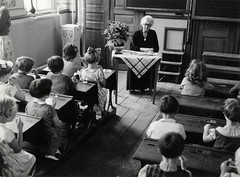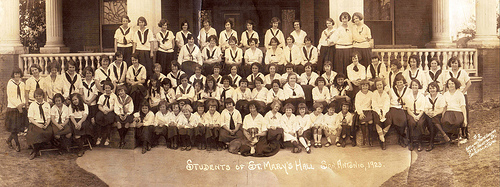This New York Times article came to my attention via Facebook (Thanks, H.B.!):
Forget What You Know About Good Study Habits
By Benedit Carey
Full article on NYTimes.com
As you can imagine, I read the whole thing on the spot. I fully recommend the entire article, and it’s not long.
I’d like to comment on a few things in the article. I’ll quote them in the order they appear:
Science and the school system
“We have known these principles for some time, and it’s intriguing that schools don’t pick them up, or that people don’t learn them by trial and error,” said Robert A. Bjork, a psychologist at the University of California, Los Angeles. “Instead, we walk around with all sorts of unexamined beliefs about what works that are mistaken.”
Take the notion that children have specific learning styles, […] In a recent review of the relevant research, published in the journal Psychological Science in the Public Interest, a team of psychologists found almost zero support for such ideas. “The contrast between the enormous popularity of the learning-styles approach within education and the lack of credible evidence for its utility is, in our opinion, striking and disturbing,” the researchers concluded.
[…]
[…] many study skills courses insist that students find a specific place, a study room or a quiet corner of the library, to take their work. The research finds just the opposite. In one classic 1978 experiment, psychologists found that college students who studied a list of 40 vocabulary words in two different rooms — one windowless and cluttered, the other modern, with a view on a courtyard — did far better on a test than students who studied the words twice, in the same room. Later studies have confirmed the finding, for a variety of topics.
These paragraphs (emphasis mine) show a recurring theme of the article: the school system has not been learning from science. This is, indeed, “striking and disturbing”. But I can’t say I’m surprised. In my encounters with “education sciences” in Germany, I have to say I did not get the impression that they are very scientific. As my friend Sören Kirchner of tologo often remarks, they seem to be more in the business of reinforcing a philosophy than that of empirical science. Because “education sciences” are wedded to the traditional school system (in Germany at least, the educational sciences faculties are where accredited teacher training takes place) they typically seem rather unmotivated to produce true criticism of the beliefs that drive the traditional system. The truly critical — and I am glad to know a few such people in the faculties of a few German universities — are the exception, not the rule.
The traditional school system has stuck to the same basic paradigm since it was conceived during the Industrial revolution. Society is deeply invested in that paradigm, since the vast majority of us have been through that system, and rejecting the validity of their assumptions about learning means rejecting the validity of how we spent many (unpleasant) hours in childhood. Making that kind of concession is not easy. At this point, improving education is a matter of revolution, not evolution.
Context, relevance, context!
“What we think is happening here is that, when the outside context is varied, the information is enriched, and this slows down forgetting,” said Dr. Bjork, the senior author of the two-room experiment.
Varying the type of material studied in a single sitting — alternating, for example, among vocabulary, reading and speaking in a new language — seems to leave a deeper impression on the brain than does concentrating on just one skill at a time.
I will have to remember this next time someone tells me that students in a democratic school won’t learn anything properly because they aren’t forced to stick to a topic for 45 minutes in a static context. This research strongly suggests that the constantly changing, dynamic atmosphere of democratic schools is a terrific boon for learning. This seems right in line with the thought that having a relevant context is crucial for learning: when you learn something because it is interesting and relevant to you at that moment, you learn it better. Classrooms have a hard time providing that kind of context. A school where students explore things freely allows that relevance to happen all the time.
Exams, revisited?
[…] cognitive scientists see testing itself — or practice tests and quizzes — as a powerful tool of learning, rather than merely assessment. The process of retrieving an idea is not like pulling a book from a shelf; it seems to fundamentally alter the way the information is subsequently stored, making it far more accessible in the future.
Tests are a learning tool? I guess you really do learn something new every day! I wrote a little about testing in July, and indeed as most people do, I treated testing as mere assessment. I stand happily corrected.
In one of his own experiments, Dr. Roediger and Jeffrey Karpicke, also of Washington University, had college students study science passages from a reading comprehension test, in short study periods. When students studied the same material twice, in back-to-back sessions, they did very well on a test given immediately afterward, then began to forget the material.
But if they studied the passage just once and did a practice test in the second session, they did very well on one test two days later, and another given a week later.
It’s good to know that testing can actually help you learn things, but if this is their usefulness, this is not reflected by the way they are treated in schools and universities. I can only emphasize what I’ve said before: the importance of exam grades must be abolished. Then perhaps tests can be useful. Making test grades important only encourages the kind of learning that gets forgotten.
Like this post?

Flattr it!

![[Video] Elizabeth Lesser: Take “the Other” to lunch](https://www.didyoulearnanything.net/wp-content/uploads/video-elizabeth-lesser-take-the.jpg)

![[Video] The Democratic School in Roskilde, Denmark](https://www.didyoulearnanything.net/wp-content/uploads/05.jpg)



